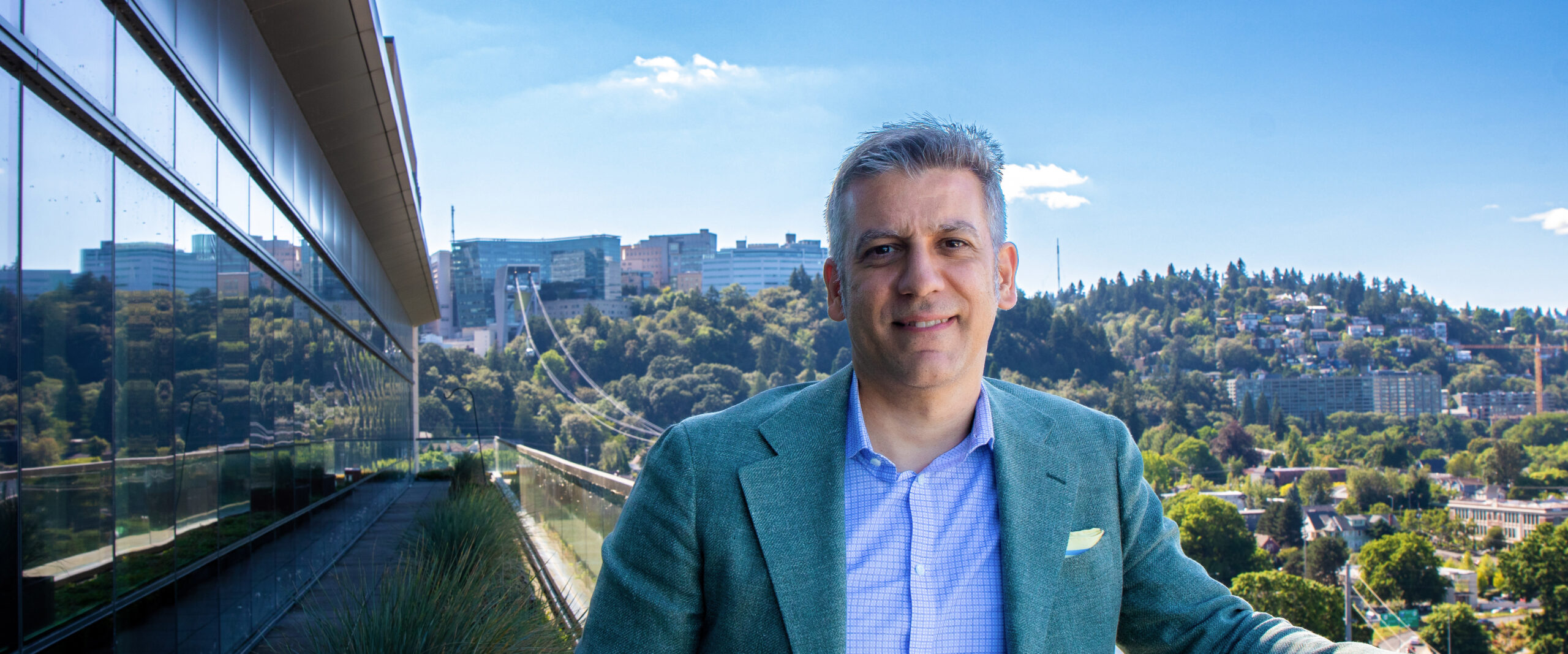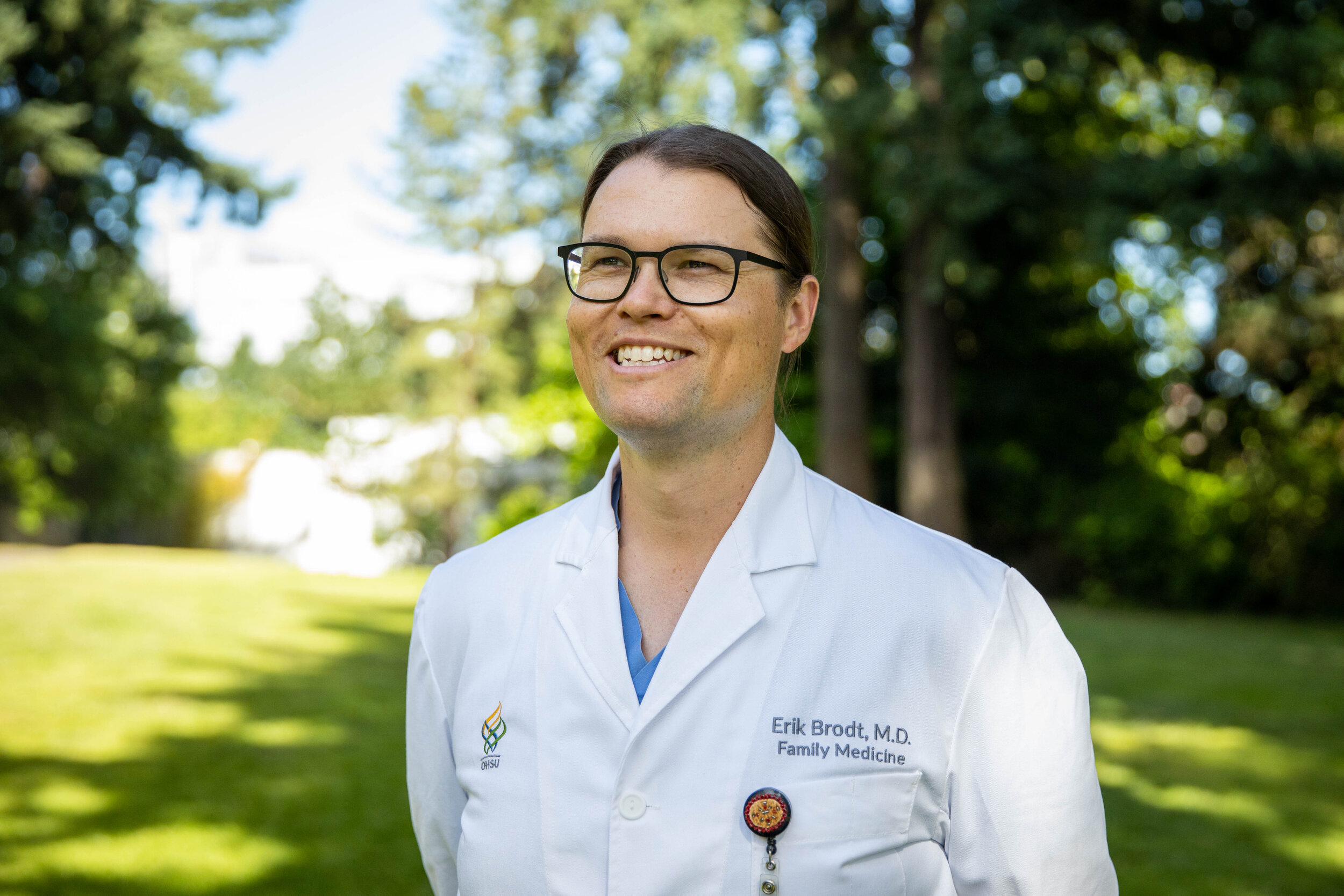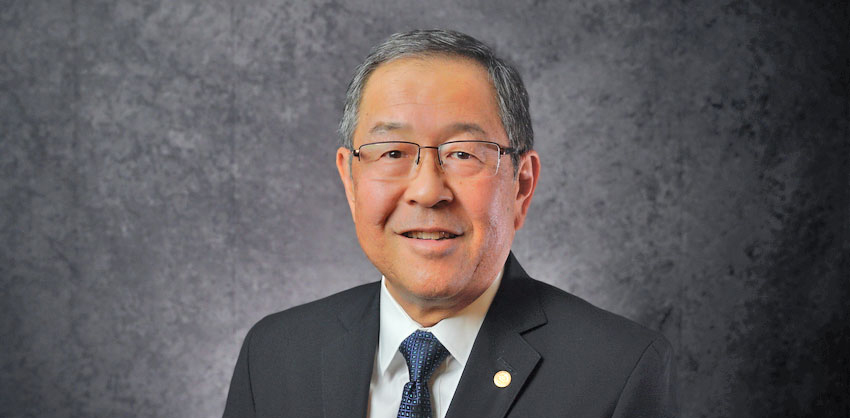The OHSU Foundation sat down with three OHSU innovators who are helping to address provider burnout and creating a healthier health care system.
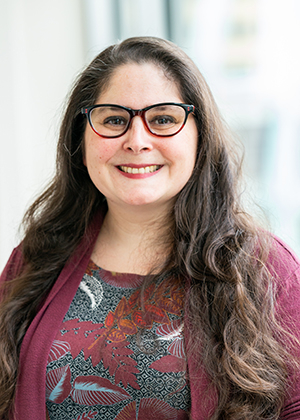
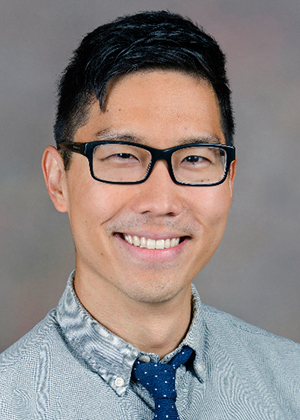
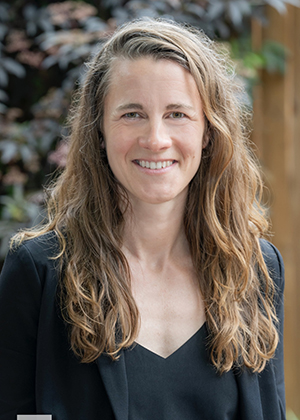
Even before the COVID-19 pandemic, the National Acadamy of Medicine found that burnout had reached “crisis levels” in the health workforce across the United States, with 35-54% of nurses and physicians and 45-60% of medical students and residents reporting symptoms of burnout. According to the US Department of Health and Human Services, burnout is defined as emotional exhaustion and depersonalization and a low sense of personal accomplishment. The U.S. Surgeon General has warned that burnout can have significant impact on mental health, as well as harmful consequences for patient care and safety.
The OHSU RELATE Lab aims to reverse this troubling trend across the health care industry. RELATE Lab brings together healthcare workers/trainees, patients, and community members to develop leaders, foster community, and build the evidence to co-create a more humanizing, equitable healthcare system.
To date, the program has served 300 OHSU professionals and students. “The early evidence is that when people feel there are strong relationships, when people feel they are seen and heard, and they belong, not only does engagement and satisfaction and well-being improve…so do things like outcomes and like good productivity,” said Brian Park, M.D., M.P.H., assistant professor OHSU Department of Family Medicine, the OHSU-PSU School of Public Health and founder and director of the RELATE Lab.
The work of the RELATE Lab has since inspired other medical centers to reevaluate their approach to supporting health care professionals experiencing or at risk for burnout and disconnection. The University North Carolina at Chapel Hill, the University of Utah and OCHIN (a national network of community health centers), as well as Portland-based Cambia Health Solutions, have all adopted practices and research born at OHSU.
Philanthropy has played an outsized role in the success of the Lab. “The Lab is entirely grant and foundation funded, so its existence and ongoing sustainability has been made possible entirely by the generosity of philanthropists who believe in a more human-centered healthcare system,” said Park.
Transcript
CJ PENSO: Hello. My name is CJ Penso. I am with the OHSU Foundation on the communications team. I am here in conversation with Dr. Brian Park, Dr. Megan Furnari, and Basilia Basin. Before we dive into the conversation, can you each give your names and your roles at OHSU so the listeners can hear the differences in your voices please?
BASILIA BASIN, Ph.D., RN: My name is Basilia Basin. I am a nurse, and I am in the role of Assistant Director for the Patient Relations department.
BRIAN PARK, M.D., M.P.H.: My name is Brian Park. I’m an assistant professor at the OHSU Department of Family Medicine and also the OHSU-PSU School of Public Health. I also get to be the founder and Director of RELATE Lab, which is a team that is creating a more human-centered, equity-promoting health care system for all who engage with it, both patients and colleagues alike.
MEGAN FURNARI, M.D., M.S.: My name is Megan Furnari. I am a physician in the Department of Pediatrics, an associate professor, and I am also one of the leaders of the OHSU Well-Being team, specifically looking at strategy and operations. Our team is trying to help the organization find a landscape where everyone can thrive, really look into some of the causes of burnout and address them from a systems and organization-wide perspective.
PENSO: Thank you, everyone. What is burnout?
FURNARI: Can I nominate Basilia to talk about burnout?
BASIN: Sure, I’ll talk about burnout for just a moment. It’s defined as an emotional exhaustion, depersonalization and a low sense of personal accomplishment, which can have mental health impacts. This came from an article that was published by the U.S. Department of Health and Human Services in May of 2022. That really resonated with me. In thinking about how people are experiencing hard times and having these senses of depersonalization, I think what stood out for me most and our space of relationality [is] that when I don’t feel connected to others or in relation for others, it’s easy for me to depersonalize, dehumanize, both myself and other people around me.
PARK: Yeah, I was thinking a lot about the disconnection piece. And I was really heartened; I think it was last year, the U.S. Surgeon General, he explicitly called out connection and community as one of I think it was five essential pillars for health care workforce well-being.
It reminded me of this story that one of my RELATE Lab colleagues shared with me. He was traveling all across the country to better understand, like, “What are the true lived experiences of burnout and disconnection in frontline clinicians?” In one of his first conversations, this clinician was sharing all the ways that they’ve felt really isolated in their work. And they asked, like, “Am I the only one who feels this alone?” And as it turns out, the researcher colleague ended up hearing some version of that comment over and over again in their year of interviews. And I bring this up just to say, like, not only do people in health care feel isolated, but it’s almost like people feel isolated in their isolation.
PENSO: Has there been an evolution in what well-being means for health care workers?
FURNARI: I want to frame it in a historical context. Health care well-being, for a very long time, we told individuals that it was all about them, that they were somehow not strong enough to be in health care. In the past 10 years, there has been a shift. We realized that it was about health care systems not being adequate and making individuals feel like they were somehow not hearty enough. And woven into all this is this theme of burnout and disconnection. All three of us do different work on that piece all over OHSU. The focus of that work is, how do we bring connection as a priority in health care? For the people that provide the health care and the people who receive the health care.
BASIN: Because I think we still hold onto this space of that individuality of well-being and we’re trying to figure out, what does it look like for a system to be well and support people well? It’s this culmination of creating space for people to have their individual coping mechanisms through meditation or yoga and hobbies and practices. And we have a system that’s set up to support that.
And then we also have a system that is set up for people not to feel like they are alone in making decisions in the work that they do. And when I was hearing Megan and Brian, you both talking about this historical perspective and these connections and relationality that you’ve built. We’re not doing this alone anymore. And that space of, “I don’t have to carry the weight of all of this by myself. And I have enough relationships with people, and I feel safe, to reach [out] when I don’t know what the heck I’m doing.” And I think that makes me feel wellness, when I have those spaces to reach out and a place to thrive instead of kind of surviving in this space of chaos.
PENSO: In all of your responses, I’m hearing this theme of recognizing the humanity in ourselves and in each other. Is that the foundation of relationality? Help me understand that here.
FURNARI: Relationality is integral to the success of well-being. It’s become harder because, during the pandemic, it created this merging of national, international, work stressors, personal stressors and everything just kind of came together and created almost an insurmountable amount of stress for many people.
PARK: As we’ve developed this really interdependent, interprofessional health care system with all these different ways of communicating, I think there’s more ways for us to either be sending each other signals of, “You belong. You’re seen. You’re valued. You’re respected here.” Or, send those opposite signals: “You are replaceable. You’re not valued.”
Just noticing how much the health care system is driven by outcomes and efficiency and productivity — we have developed this culture, whether we wanted to or not, that holds those things as core values. You know, doing things as best as we can, as quickly as we can, no matter what the cost is on all of us, collectively as people.
So much of the early evidence is that when people feel as though there are strong relationships, when people feel as though they are seen and heard, as though as they belong — not only does engagement and satisfaction and well-being improve, but, not surprisingly, so [do] all those things that we care about right now, like outcomes and like good productivity, as well.
PENSO: Perfect transition. What is relational leadership?
FURNARI: Relational leadership, to me, is when the team feels like every voice matters. They can speak up if they have an idea or question or worry. Yes, you still have to round and get through the process, but I think there’s a different palpable experience when everyone feels like they can contribute, versus when people are feeling that, like, sense of shame or power-over, where they don’t feel like they can speak something that could be critical to patient management, decision-making, safety, outcomes, taking care of a human being (to put in the words that I prefer.)
The Relational Leadership Institute [at] RELATE Lab is working on this belonging. Back to the beginning of everything, like — how do we address burnout? How do we do system change? It’s about belonging. It’s about connections. It’s about relationality and empowering leaders. So, full circle.
I have a colleague at another academic medical center who did a big burnout study. And I’m not going to give you definite details because it’s not published, but he told me one of the biggest factors that linked to higher burnout was a low sense of belonging. They did surveys for both. And that’s pretty unusual – not everyone surveys for belonging. And I just thought that was a nice thing to name, that that’s something you can actually take action on pretty quickly as a manager or a leader.
BASIN: When I think about relational leadership and what it is and how it shows up: that space of humanness. It’s about embracing my own humanness and the imperfections that I bring to the world and my areas of expertise, and also knowing where I really need support and interdependence from others, as well as recognizing and understanding the humanness of others.
I will share a story from even what happened to me today. I was in our daily huddle with the team, and we were discussing a case that had come forward. I had offered to the person I was working with, I said, “You know, you can just give them a call and just talk with them about it briefly, state where our values are at.” And then I kind of reflected back today and I said back to the group, “You know, I actually handled that situation in a way that I didn’t want to. I think what I really needed to do was understand more about what was going on here. And I apologize that I had asked you to make that call. That probably wasn’t the most appropriate thing to do.”
And I wanted to share that back with the group where, in the moment, I had made a decision that wasn’t appropriate. And I think from what I have learned from the RELATE Lab and human-centeredness and embracing my own space of imperfection, that I was able to say that and not feel like I’m a terrible person who made a huge mistake. I think [that], for me, feels like relational leadership in action.
PENSO: How is relational leadership taught at OHSU? Is this something that is offered to current students, current practitioners?
PARK: The main way that we’ve been able to share relational leadership with others is through the Relational Leadership Institute, or RLI. So, it’s a three-month leadership development program that, because of our values, is interprofessional and is cross-generational. We’ve had about 300 people, I believe, at OHSU go through it. Thanks to amazing connections, collaborators — like Meghan is one in the medical school — we have been able to find pockets to teach relational leadership to medical students and really giving medical students from, like, year one, year two a different look on what leadership in academic medicine or in health care can look like.
We started at OHSU and we’re really proud of that. Somehow people at the University of North Carolina and the University of Utah heard about it. So, we’ve been able to expand RLI there. And then OCHIN, which is a national network of community health centers, and then Cambia Health Solutions, also a regional network of community health centers, also heard about it and have their own relational leadership programs as well. So, kind of going outside of academia and into, like, health center settings. We’re really excited about being able to bring this to different places all across the country.
FURNARI: There are so many brilliant people all over this organization. It’s one of the things I like best about OHSU, and probably the thing I hear the most commonly for why people stay at OHSU.
PENSO: And if you two have any examples of how relational leadership manifests in the clinical setting or the research setting or the academic setting, that would be really helpful to hear as well.
FURNARI: So, Brian and I were residents together. We got to run rounds. We had this one patient who was an older teen with diabetes that was really poorly managed, and he didn’t really want to talk to anyone at all. We would go in the room and he would be faced away from the team. The energy was an embarrassment or a discomfort with the medical team.
Brian and I decided to make it about just, like, telling stories and asking the patients what they wanted to talk about and share. When we had framed it like this, it wasn’t scary anymore. And I think he said something along the lines of, “I’m just so happy that I can come here when I can’t manage my disease and you all can, basically, help me get back on track and go back into my life and start over again.” And I remember being like, “That. That’s relational leadership. That’s relational care. That’s what I wish I could do every day with every patient that I work with in my career.”
PARK: It’s about shifting people. So much of my day is trying to shift another human being to understand their disease process and why changing a behavior or taking medication is really important, or trying to support a colleague to move through a really complex problem. Like, that actually makes up my day more than a very technocratic problem that requires, like, a certain knowledge set.
PENSO: Thank you so much, all of you. And for anyone listening who is external to OHSU, if you’re interested in supporting the incredible work that is being done by any of these three individuals on this conversation, please do not hesitate to reach out to the OHSU Foundation.
You can find out more information and how to connect with us at ohsufoundation.org. Megan, Brian, Basilia: Thank you so much for participating in this conversation. It has been a wonderful experience.

